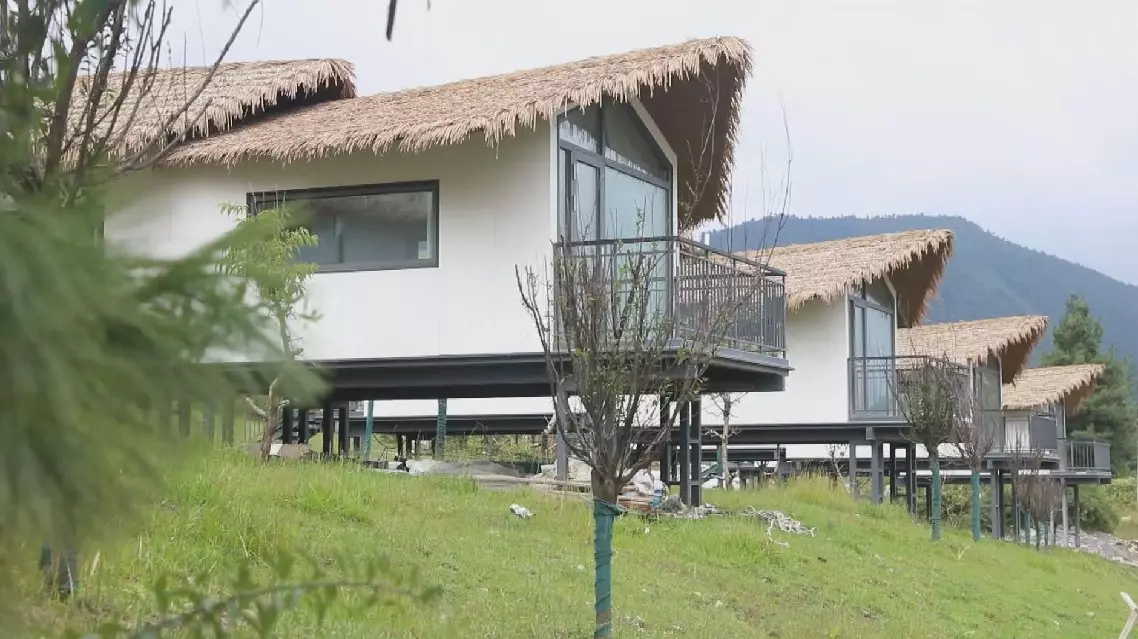A remote village on China's southwestern border, where many residents only became Chinese citizens two decades ago, has been dramatically transformed by government-backed tourism initiatives and modern infrastructure development.
Daman Village, nestling in the mountains of Gelong Town in southwest China's Xizang Autonomous Region, has undergone a remarkable transformation over the past few years. What's so special about this village is that out of its 89 households, 57 were officially granted Chinese citizenship in 2003. Now, thanks to significant government investment, the village is becoming a burgeoning tourist destination.
The newly completed mountain-view guesthouses, which represent one of the key government-funded projects, offer breathtaking views of snow-capped peaks draped in mist from their balcony.
"The total investment so far has exceeded 60 million yuan (about 8.55 million U.S. dollars). We're also constructing a tourist reception center and renovating many homes into guesthouses. This project marks the largest one we've undertaken since the villagers became Chinese citizens 20 years ago. It will not only boost local employment but also significantly increase incomes," said Kunchok Dorjee, Party Secretary of Chongdui Village, which administers Daman Village.
This sum of money represents the largest government investment in Daman Village since its formal establishment. Beyond tourism, the funding has been used to rebuild the homes of all 89 families.
Daman, meaning "cavalry" in Tibetan, traces its roots back to Gurkha soldiers native to ancient Nepal who, after allegedly losing a battle with the Qing Dynasty (1644-1911) forces, became separated from their main army and remained stranded along the border.
For generations, their descendants roamed the borderlands between China, Nepal and India, without nationality or official status. Their long journey as a stateless people finally ended in 2003 when the Chinese government granted them citizenship, classifying them as Tibetan.
Xu Hongbin, originally from Chengdu City of southwest China's Sichuan Province, married a local woman from Daman Village. Reflecting on his first visit to the area a decade ago, Xu marveled at the changes the village has experienced in such a short period.
"A decade ago, there was only one road into the town. Now there are at least four. Everywhere you look, there are new buildings, guesthouses and restaurants. The development has been incredibly fast," he said.

Tourism fuels transformation in border village as residents mark 20 years of citizenship
Macao has been emerging as a global hub for conventions and exhibitions in recent years by exploring the enormous opportunities in the sector, driving the region to advance its economic diversification and embrace a brighter future.
Macao has received many awards this year, such as the Best Convention City (Asia) and the Best BT-MICE City, showcasing the recognition for and influence of Macao's exhibition industry.
More than 1,000 electronic game enthusiasts from all over the world gathered recently in Macao to participate in a esports themed event.
Su Zhili, organizer of the event, said that Macao's rich experience in hosting large-scale events, coupled with its good infrastructure, has driven him to choose the region as an ideal destination to hold such an activity.
"Macao has held many similar large-scale events. It has rich experience, and the facilities at the venue are relatively mature, so we can start our work comfortably," said Su.
During the first three quarters of 2024, Macao held more than 1,000 conferences and exhibitions in total.
"We will invite more professional, special conferences to be held in Macao and also cultivate more exhibition brands with international influence in Macao, so as to promote Macao's exhibitions to be more market-oriented, professional, international, digital and greener from various aspects. This is our goal," said Elaine Wong, member of the Macao Commerce and Investment Promotion Institute.
In addition, multiple large exhibitions and conferences, such as the Macao International Trade and Investment fair, the Macao Franchise Expo, and the International Infrastructure Investment and Construction Forum, are held regularly in Macao.
With the introduction of a series of policies and measures to facilitate the exchanges between the mainland and Macao, as well as the construction and development of the Guangdong-Hong Kong-Macao Greater Bay Area and the Guangdong-Macao In-Depth Cooperation Zone in Hengqin, Macao's convention and exhibition industry will embrace more opportunities for development in the foreseeable future.
"We have such a good industrial base in the Greater Bay Area. The mode of 'Convention and Exhibition + Industry' not only integrates the industries of Macao, but also the industries of the Greater Bay Area. In addition, Macao actively integrates into the national development and plays a role in the Belt and Road. Why are we so confident in Macao's convention and exhibition sector? Because it is backed by the motherland, and the country gives Macao great support," said Alan Ho, chairman of the Macao Association of Convention, Exhibition and Tourism Sectors.

Macao emerges as global hub for conventions and exhibitions, driving economic diversification and international recognition










